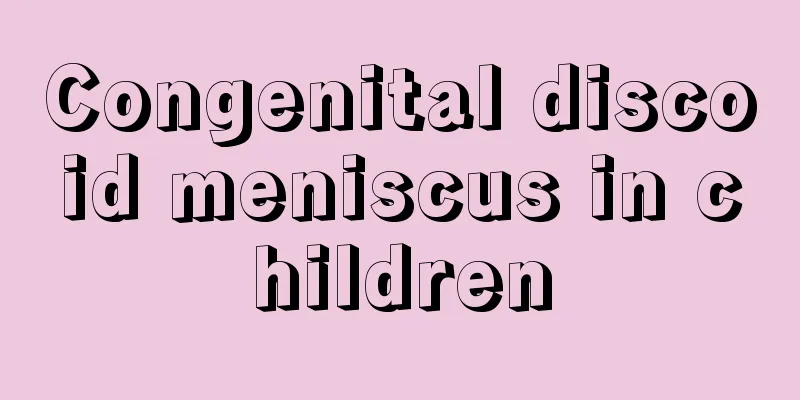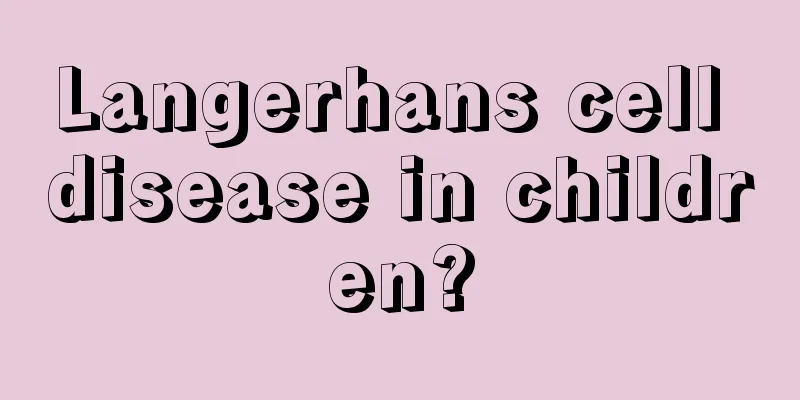Congenital discoid meniscus in children

|
Almost everyone knows that the meniscus is a very important part of the knee joint. Problems with the meniscus directly affect our normal walking, but some children's meniscus is disc-shaped, which is very different from the normal meniscus. When this happens, parents are always very anxious, and the solution becomes very serious at this time. So what should we do about children with congenital discoid meniscus? 1. What is congenital discoid meniscus Congenital discoid meniscus is a congenital malformation in which the normal meniscus of the knee joint is replaced by a discoid meniscus of fibrocartilaginous tissue. It manifests as disc-shaped hypertrophy of the meniscus of the knee joint. It is a common congenital malformation of the knee joint in children. It is more common to occur on one side, especially on the outside. There is no gender difference in the disease and it is not hereditary. 2. Causes The pathogenesis is still unclear. It may be that during the fetal development period, the posterior horn of the lateral meniscus had no attachment point, and the medial femoral condyle and the posterior part of the lateral meniscus were connected by the lamina femoralis ligament. As a result, when the body straightened the knee joint, the meniscus shifted posteriorly and medially due to the traction of the ligament and reached between the femoral condyles, and returned to the lateral side when straightened. Such repeated friction and pressure caused the meniscus to proliferate and thicken, forming a disc-shaped meniscus of fibrocartilage. 3. Clinical manifestations In infancy, there are generally no obvious clinical symptoms. As children grow older and become more active, they may experience clicking in the affected knee or pain, joint swelling, and lameness during strenuous exercise. The joints are less stable and, in severe cases, their movement is limited. In addition, when the discoid meniscus is torn in the knee joint due to trauma, obvious swelling and congestion in the joint cavity may occur. In rare cases, when the knee joint is hyperextended, obvious pain on the lateral side of the joint, joint locking and joint effusion often indicate a meniscus tear. IV. Treatment 1. General treatment For asymptomatic discoid meniscus, there is no need to restrict activities. Only regular check-ups and health education are required to protect the knee joint and avoid traumatic discoid meniscus tears. 2. Surgery For meniscus tears with obvious symptoms, recurrent attacks or traumatic causes, with swelling and exudation of the knee joint and limited joint function, surgical treatment is often used, and the treatment effect is generally good. Surgery to remove all or part of the meniscus to prevent it from damaging the joint cartilage. Currently, arthroscopic meniscectomy is often performed, which can be partial, subtotal or total, and can also remove the torn part. Note that joint function exercises should be started 2 to 3 weeks after surgery. |
<<: A one and a half month old baby's alkali phosphatase is as high as 810
>>: What should I do if my baby who is more than two months old always has feces on his buttocks?
Recommend
The baby will turn sideways during the confinement period
Newborn babies are curious about the world. They ...
How to teach your child to spit
Everyone knows that having phlegm stuck in your t...
What to do if your baby has anorexia and picky eating
Many babies can eat a lot of the things they like...
What is the treatment for allergic cough in children?
When a child shows symptoms of coughing, parents ...
My daughter has white spots on her face
In our lives, there are many mothers who are very...
What kind of milk is good for a 2-year-old child?
Two years old is also the golden period for a chi...
2 years and 3 months old baby does not speak
In life, many babies have congenital language dis...
Can babies smell musk ointment?
Musk plays a very important role as a Chinese med...
Does a one-year-old baby need to go to the hospital if he coughs at night?
Many female friends who have just become mothers ...
Do newborns also have false menstruation?
Many newborn baby girls may have bloody vaginal d...
Baby's nails are uneven
The baby's nails have a certain indicative si...
What foods are good for calcium supplementation in 10-year-old children?
Every parent hopes that their child can be health...
Five month old baby pillow
Babies develop very quickly, and each stage of de...
What are the solutions for children’s cough and diarrhea?
Children often have symptoms of coughing. This is...
Is perfume harmful to newborns?
Spraying perfume is no longer exclusive to women....









